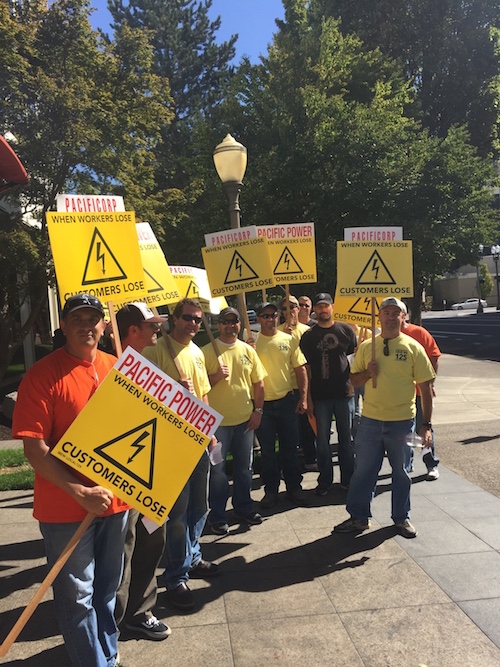Opposition to Obamacare’s so-called “Cadillac tax” is growing in Congress and on the 2016 campaign trail, and IBEW officials are helping to lead the charge for its repeal.
The tax, which is scheduled to take effect in 2018, is already wreaking havoc on contract negotiations across America, with employers scrambling to reduce health benefits to meet strict restrictions imposed on health care spending.
Capped at $10,200 for individual health plans and $27,500 for family plans, many negotiated union benefit packages are in danger of exceeding the limits and becoming subject to a costly 40-percent excise tax.
 |
| IBEW members and supporters picket Pacific Power in Portland, Oregon. The company, like others around the country, is proposing health care cuts to dodge the impact of the “Cadillac Tax,” but failing to compensate employees for the loss.
|
“Despite the fact that this thing doesn’t take effect for more than two years, locals are already having to factor its effects into their contract negotiations,” said Dan Gardner, an international representative in the Political and Legislative Department.
“The trouble,” Gardner said, “is that the White House and the Congressional Budget Office assume that when a company reduces benefits on one side of the equation, they’re adding that money back in wages. And anybody who has ever sat on our side of the negotiating table knows that is pure fantasy.”
Take the case of Portland, Ore., Local 125, where negotiations with Pacific Power carried on for a year before more than 150 members and supporters picketed the utility’s headquarters on Sept. 23.
Faced with a 3 percent shift of health care costs toward workers after conceding even larger percentages during their last two contract negotiations, members had had enough.
“We’ve already had to make changes to our health care to prepare for the excise tax,” Local 125 Business Manager Travis Eri said, but the company’s latest demands were just too much. “We’ve had to adjust, because if you don’t build up to it slowly, the shift of the health care burden toward members in 2018 would be too drastic for people to handle.”
So Eri and negotiators crunched the numbers and figured the company’s position—a move from a 78-22 employer-employee health care split to a proposed 75-25 share—would equate to 1 percent of payroll.
“We threw a bunch of options at them,” Eri said. “We asked for a 1 percent pay increase. They said no. We asked for vacation days. They said no. We asked for a 1 percent match on a 401(k). They said no. Their pay increase proposal was already well under the industry standard, so their refusal to budge on this just feels like a typical profit grab.”
Gardner pointed to Local 125’s standoff with Pacific Power as a prime example of what the Cadillac tax’s proponents fail to understand.
“The Congressional Budget Office says repealing this excise tax is going to cost $87 billion in lost revenue,” he said, which was part of the original plan to check rising health care costs and to pay for the costs associated with the Affordable Care Act. “But ACA has already saved hundreds of millions the accountants in Congress didn’t anticipate, so it’s not really much of an argument.
“And,” Gardner added, “that’s before we even get to this $87 billion number. Local 125’s negotiation has shown us that companies don’t just give you that money back when they reduce their health care costs and shift the burden to our members. But three-quarters of the $87 billion is the CBO anticipating higher payroll taxes based on the insane argument that employers will just voluntarily hand over the cash they save to their employees in the form of pay raises. If only it actually worked that way.”
And labor’s argument seems to be catching on. In Congress, two bills have been filed in each chamber that effectively eliminate the tax, several with broad bipartisan support, and both Bernie Sanders and Hillary Clinton have called for its repeal from the 2016 campaign trail. Meanwhile, the AFL-CIO, the IBEW, and other affiliated unions are working hard behind the scenes to add even more co-sponsors aimed at ensuring that a fix will sail through Congress.
Some economists, however, are mounting a full-court press to keep the provision, arguing the Cadillac tax is the only way to check health care costs that have spiraled out of control.
Since World War II, employer contributions to health care costs have been tax-free, so the economists argue that a dollar spent on health care is effectively cheaper for employers than the same dollar spent on employee wages. The Cadillac tax, they say, shifts that equation in favor of wages, so, theoretically, employers will boost take-home pay when health care costs are capped.
“The problem with that theory,” says Gardner, “is that it’s not how it works in the real world. Economists may think it just makes logical sense, but when you’re sitting across a negotiating table like they’re doing out in Portland right now, these companies are trying to wring out every last cent they can and the Cadillac tax is just another excuse to claw back benefits and boost profits.
“We’ve got locals across this country who have given up pay raises for years in favor of better health care,” Gardner said, “and now this tax is threatening to undo all of that. Whether it gets repealed or Congress and the White House can agree on some kind of fix, we’ve got to get it done now. It’s about treating people fairly.”
Photos courtesy Local 125.